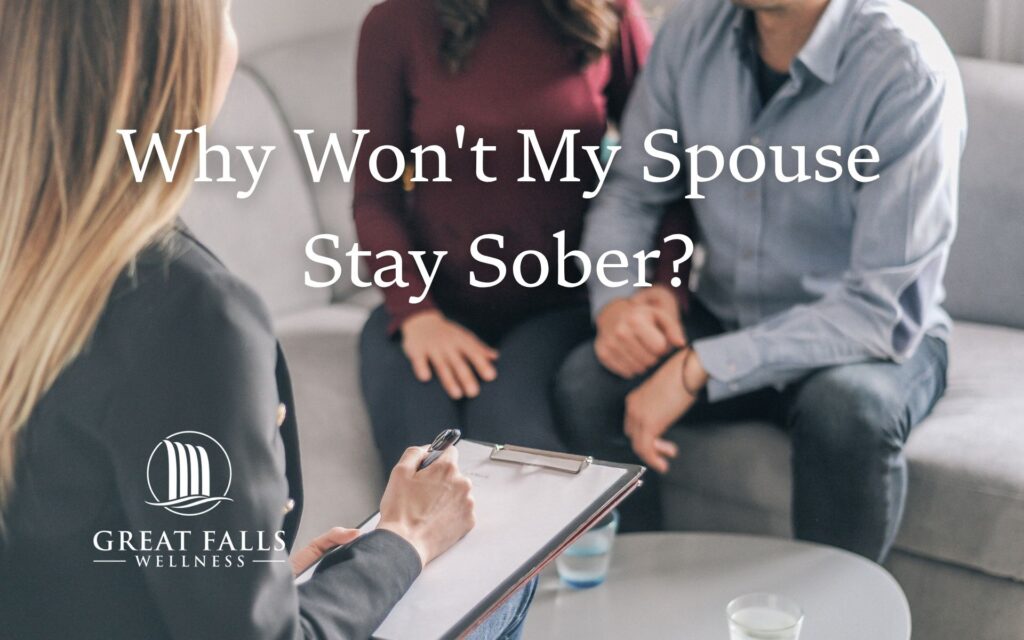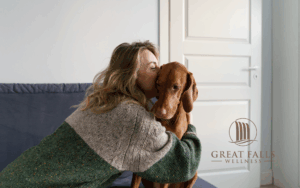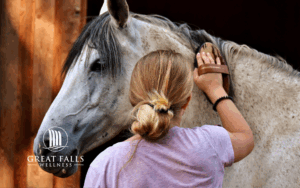If you’ve ever asked yourself, “Why won’t my spouse stay sober?” you’re not alone. Watching someone you love relapse again and again can leave you feeling confused, helpless, and emotionally drained.
At Great Falls Wellness, we work with individuals and families facing this very struggle. Understanding the deeper reasons behind relapse is the first step in helping your spouse and taking care of yourself.

Why won’t my spouse stay sober?
Addiction is not a choice or a character flaw. It’s a chronic illness that affects the brain’s reward system. Even after completing treatment, many people relapse. That doesn’t mean they don’t want to stay sober. It means the brain is still healing, and old habits can be hard to break.
Unresolved emotional and mental health issues
Substance use is often a coping mechanism. If your spouse hasn’t dealt with underlying trauma, anxiety, depression, or stress, those emotions may lead them right back to substance use. Without addressing these root issues, sobriety becomes harder to maintain.
Therapy plays a major role in uncovering and treating these deeper struggles. At Great Falls Wellness, we offer family therapy as part of our outpatient addiction rehab services to help spouses and loved ones understand how addiction impacts the whole family and how to move forward together.
Lack of structure and accountability
When people leave treatment too soon or without setting up a strong foundation for continual recovery, they often lose the structure that helped them stay on track. Without regular therapy sessions, recovery check-ins, or community support, it’s easy to slip back into old routines.
Sobriety thrives with routine and accountability. If your spouse isn’t connected to a consistent support network, they may feel overwhelmed and alone in their recovery.
Some of the things we do to lay the foundation for recovery success include using a variety of clinically proven approaches to addiction treatment in our intensive outpatient groups, featuring equine therapy for addiction, trauma-informed yoga therapy, and art therapy to engage mind, body, and spirit in the process of recovery, as well as having a welcoming community with aftercare support and using empathetic sober coaches to bridge the gap between clinical care and real life application.
We recognize that not everyone learns and heals the same way, and that not all aspects of a person are healed with one type of treatment; because of this, we use a variety of clinically proven treatment approaches to give each individual the best chance of long-term recovery.
Misunderstanding the recovery process leads to asking “Why won’t my spouse stay sober?”
Some people believe finishing a treatment program means they’re “cured.” But recovery is not a one-time event. It’s an ongoing process that takes time, effort, and patience. Your spouse might feel frustrated or disappointed if they expected things to get better right away.
Relapse doesn’t mean failure. It’s a signal that more support or different tools may be needed.
Poor stress management and daily triggers
Life is full of stress. Without healthy coping strategies, many people turn back to substances when things get tough. If your spouse hasn’t learned how to handle stress, boredom, or emotional pain without substances, those triggers can pull them back into addiction.
Part of recovery is learning new ways to respond to everyday challenges. That takes practice and time, and sometimes additional therapy or treatment.
Support for you and your family
Addiction doesn’t only affect the person using. It affects the whole family. You may feel exhausted, resentful, or stuck. That’s why support for you is just as important.
In addition to our therapy services, we recommend outside support groups like Al-Anon. As they explain, “You didn’t cause it, you can’t control it, and you can’t cure it.” That’s a powerful reminder when you’re doing everything you can but still asking why won’t my spouse stay sober.
How Great Falls Wellness can help
Great Falls Wellness is an outpatient addiction rehab center located in Northern Virginia. We serve individuals and families in the greater Washington, DC region, including Great Falls, McLean, Vienna, Arlington, Oakton, Burke, Reston, Herndon, Falls Church, Fairfax, Bethesda, Potomac, and other Northern Virginia communities, as well as Washington, DC.
Our programs focus on personalized care for both individuals and families. Through outpatient treatment, individual therapy, and family support, we help build a solid foundation for long-term sobriety.If you’re wondering why won’t my spouse stay sober, know that you’re not alone—and help is available. Contact us today to learn how we can support your family’s recovery journey.



